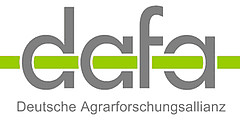For more animal & consumer protection: Agricultural scientists pushing for more research [29.03.12]
Practical approaches and long-term visions: That is what animal protection requires according to Germany’s agricultural scientists speaking at the specialists’ convention on farm animals at the University of Hohenheim / A strategy paper is planned for the end of May.
Animal keeping which revolves more strongly around the animal itself and is widely accepted by the general population: This is the concrete goal of the initiative. But the road is a long one according to the results of the second annual think tank which took place at the University of Hohenheim. “Instead of treating single symptoms, what we need is research that opens doors to taking proper action and introduces new concepts”, says Prof. Dr. Hubert Wiggering, spokesperson for the German Agricultural Research Alliance (DAFA). In order to achieve that, a kind of “federal programme concerning livestock farming” is needed and one which “unites research endeavors to achieve this on a long-term basis.” That is what 130 participants from the fields of science, society, research sponsorship, politics and business are currently discussing in Hohenheim.Use of antibiotics, industrial-sized farms and high-performance livestock “The way in which livestock is treated is nowadays the object of much criticism by a large part of the population - this is something which research needs to focus on”, according to Prof. Dr. Thomas Jungbluth, one of the two initiators of the think tank and co-organiser of the convention at the University of Hohenheim.
According to the scientists who are involved, reform is also needed within the science of agriculture itself. “Farms in certain parts of Germany have a livestock population density which is frightening from an environmantal and animal disease point of view”, says Prof. Dr. Folkhard Isermeyer, the other initiator of the think tank.
The problem, however, is so complex that only a fantastic new approach would be of any help according to Prof. Dr. Wiggering, speaking on behalf of the DAFA. “We need a two-fold approach: The scientific community must have the courage to challenge and re-think the current systems of production. Until the finish line to success has been reached, it must also help existing practices to be improved step by step so that enterprises remain competitive and, at the same time, measurable progress has been achieved regarding animal welfare and animal health.”
CURRENT DEVELOPMENTS HIGHLIGHT THE URGENCY
The urgency to undertake radical changes is even clearer when one looks at the latest developments:
Livestock husbandry is strongly on the rise worldwide: The world agricultural sector currently produces 300 million tons of meat annually, or in other words, 43 kilos for every person on the planet. The Food and Agriculture Organization of the United Nations (FAO) expects this figure to double within the next 40 years. Production is increasing most significantly in regions in Asia, South America and Africa. Conversely, in Europe, with the exception of Germany which exports meat, it is shrinking.
In Germany, 60% of all income from agriculture is based on animal products. Approximately 600,000 earn their living with jobs in livestock husbandry and the production of meat and dairy products.
The consolidation of smaller farms into larger industrial-sized ones is a trend which is taking place as well: Nowadays every second pork cutlet comes from a farm with more than 1,000 pigs. Every second boiled egg which lands on the breakfast table comes from a farm with more than 50,000 hens.
Recent surveys on the subject, e.g. the Eurobarometer, show that 66% of all persons in Germany find the way in which animals are kept on farms “disquieting”.
PLEA FOR A LONG-LASTING, HOLISTIC STRATEGY
Admittedly, the concerns of many social groups can often be described as being rather diffuse. Some of their demands apparently contradict one another, according to researchers.
For that reason, scientists must not become too deeply wrapped up in single issues. “What we need is an overall strategy. One which fosters collaboration among animal researchers, agricultural economists, veterinarians, environmental researchers and numerous tangent disciplines can work together”, according to Prof. Dr. Wiggering.
STRATEGY PAPER TO APPEAR AT THE END OF MAY
Researchers are planning to present their strategy paper at the end of May. In preparation for this, they have convened on many occasions since autumn 2011. The recent convention marked the end of the preparatory phase. The results of and insights gained at the convention must now be incorporated into the strategy paper, which will be presented to the DAFA.
The DAFA comprises 55 member institutions from the field of agricultural research and, as such, provides a cross-section view of the research activities being conducted at universities, technical colleges and other research facilities from the federal and state governments not affiliated with any university. A rough draft of the strategy paper is available at www.dafa.de.
Text: Klebs, Transl.: O'Mealy
Contact for press:
Universität Hohenheim:
Prof. Dr. Thomas Jungbluth, Leiter des Fachgebiets Verfahrenstechnik der Tierhaltungssysteme und Mitglied der Steuerungsgruppe des Fachforums Nutztierhaltung, Tel.: 0711 459 22835, E-Mail: Thomas.Jungbluth@uni-hohenheim.de
DAFA-Geschäftsstelle:
Dr. Doris Lange, Geschäftsführung , Tel: 0531 596-1019, E-mail: d.lange@dafa.de

